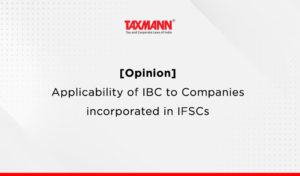[Opinion] Applicability of IBC to Companies incorporated in IFSCs
- Blog|News|Insolvency and Bankruptcy Code|
- 3 Min Read
- By Taxmann
- |
- Last Updated on 1 March, 2023

Introduction
Keeping Ease of Doing Business (EoDB) in mind, the Government of India, since 2014, has undertaken a host of reforms to boost India’s viability as an investment destination of global repute. The IBC is one of such reforms. In addition to this, the government has also created an ecosystem for IFSCs, to provide international finance services to non-resident investors. IFSCs are designated areas that offer financial services to clients located outside the jurisdiction of the host country. These designated areas are a separate jurisdiction from the host country, being regulated by civil and commercial laws different from those of the host country.
Gujarat International Finance-Tec City (GIFT City) near Ahmedabad is India’s first IFSC, created with the vision to compete with the Dubai International Financial Centre (DIFC) and its peers worldwide.
It is regulated by the International Financial Services Centres Authority (IFSCA), created by the IFSCA Act, 2019. GIFT City by itself is also recognised as a Special Economic Zone under the SEZ Act, 2005.
G.S.R. 08(E) and 9(E) dt. 04.01.2017 extends the provisions of the Companies Act, 2013 to the GIFT City, creating a new class of companies called “Specified IFSC Companies”, further subdivided as “Specified IFSC Public Companies” and “Specified IFSC Private Companies”.
These IFSC Companies offer novel financial services, such as aircraft and vessel leasing, access to foreign currency loans against Indian rupee deposits, among others, to stakeholders in India and abroad.
The IFSCA Act, 2019 makes the IFSCA a single, unified regulator, giving it the powers and functions of the Reserve Bank of India (RBI), the Securities and Exchange Board of India (SEBI), Insurance Regulatory and Development Authority of India (IRDAI), and the Pension Fund Regulatory and Development Authority (PFRDA) – all major financial sector regulators of India.
However, the IBC does not make any express or implicit provisions for Specified IFSC Companies, neither does the IFSCA Act give any powers of the Insolvency and Bankruptcy Board of India (IBBI) to the IFSCA – thus making it clear that there is no interplay between the IBC, the SEZ Act and the IFSCA Act.
This begs the question: What is the insolvency regime applicable to Specified IFSC Companies?
History of IFSCs in India
The concept of an IFSC for India was first mooted by the High-Powered Expert Committee on Making Mumbai an International Financial Centre, appointed by then Minister of Finance P. Chidambaram in 2005. The committee comprised of eminent industry experts, like Percy Mistry, Aditya Puri, KV Kamath, among others, along with central and state bureaucrats.
This committee undertook a threadbare analysis of what is required to set up an IFSC in India (preferably in Mumbai), by the way of infrastructure, legislation, regulations, product mix, risks and benefits, governance framework, among others. In its report, the committee found that a complete overhaul of all of the above parameters would need to be taken up in order to make an Indian IFSC successful.
Due to politico-economic reasons, this report did not cause any change, and the plan to found an IFSC in India remained on the drawing board.
However, Gujarat, under then Chief Minister Narendra Modi adopted this report, and began taking steps to develop an area near Ahmedabad and Gandhinagar as an IFSC, called the GIFT City. This plan obtained approval from the Union Ministry of Commerce and Industry in 2011, giving GIFT City recognition as an SEZ under the SEZ Act, 2005.
Upon the election of Narendra Modi to the Prime Minister’s Office with a resounding mandate in 2014, he took steps to refine this plan further, and establish One Authority over all matters pertaining to the IFSCs, and thus, the IFSCA was established.
Click Here To Read The Full Article
Disclaimer: The content/information published on the website is only for general information of the user and shall not be construed as legal advice. While the Taxmann has exercised reasonable efforts to ensure the veracity of information/content published, Taxmann shall be under no liability in any manner whatsoever for incorrect information, if any.

Taxmann Publications has a dedicated in-house Research & Editorial Team. This team consists of a team of Chartered Accountants, Company Secretaries, and Lawyers. This team works under the guidance and supervision of editor-in-chief Mr Rakesh Bhargava.
The Research and Editorial Team is responsible for developing reliable and accurate content for the readers. The team follows the six-sigma approach to achieve the benchmark of zero error in its publications and research platforms. The team ensures that the following publication guidelines are thoroughly followed while developing the content:
- The statutory material is obtained only from the authorized and reliable sources
- All the latest developments in the judicial and legislative fields are covered
- Prepare the analytical write-ups on current, controversial, and important issues to help the readers to understand the concept and its implications
- Every content published by Taxmann is complete, accurate and lucid
- All evidence-based statements are supported with proper reference to Section, Circular No., Notification No. or citations
- The golden rules of grammar, style and consistency are thoroughly followed
- Font and size that’s easy to read and remain consistent across all imprint and digital publications are applied



 CA | CS | CMA
CA | CS | CMA
